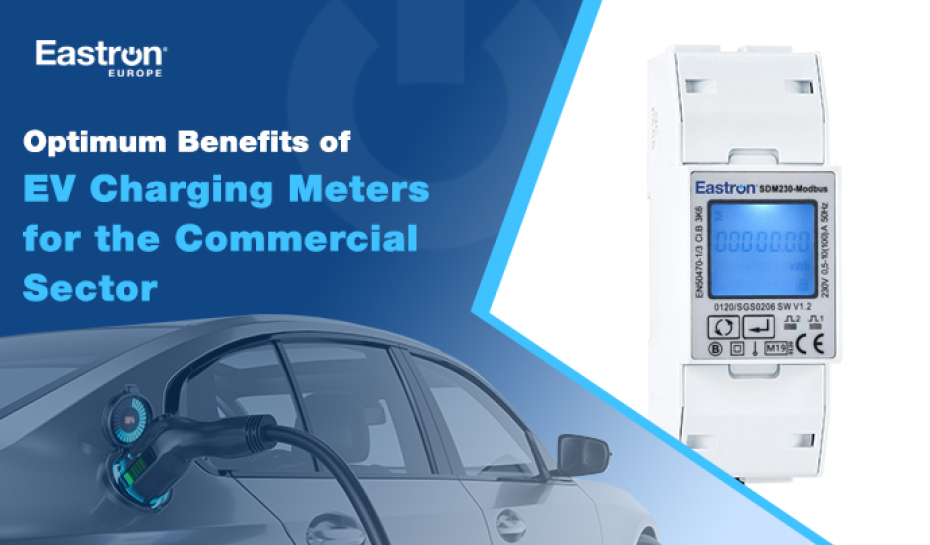
Optimum Benefits of EV Charging Meters for the Commercial Sector
Electric vehicles are increasingly finding their spot on busy roads, replacing their environmentally damaging counterparts. Being ecologically conscious is in vogue, and the fever is catching up fast, with EV cars and trucks as primary examples gradually pushing the modes of transportation running on harmful natural gas and oil in the near past. However, till 2023, UK roads have seen an influx of 975,000 fully electric vehicles so far. The excellent news is that petrol, diesel, and hybrid cars are being phased out, and expectedly, by 2040, there could be as many as 36 million electric vehicles on UK roads. With so many EV cars running around, portable charging stations are mandatory, and so are EV charger metering infrastructure for monitoring power usage.
For commercial sectors, this new phase of convenience presents a unique earning opportunity. Smart meters for EV charging in their commercial spaces will benefit the sectors in a great many ways.
Since EV charging stations have become a common sight in big cities, public areas, and commercial buildings, putting together an infrastructure for EV charger metering has become non-negotiable. The reason is that electric vehicles are still drawing power from fossil fuels indirectly unless provisions are made for cleaner energy to support vehicular charging.
Who Benefits from a Commercial EV Charging Point?
As the prevalence of electric vehicles continues to rise, numerous enterprises are contemplating the incorporation of EV charging stations at their locations. This spans a range of establishments, including hotels, shopping centers, offices, libraries, and warehouses. The deployment of commercial EV charging infrastructure not only presents an excellent opportunity to generate supplementary revenue but also serves to counterbalance carbon emissions. Among the notable advantages are:
Increased Footfall
Commercial charging stations typically employ 50kW fast or rapid chargers, taking 45-60 minutes for a full charge. EV drivers prefer locations allowing them to spend time. With only 18% of UK supermarkets offering EV stations, providing one can attract visitors, boost foot traffic, and extend their stay.
Profit Boost
Businesses often choose to set up paid EV charging stations, akin to selling electricity, much like petrol stations sell diesel. Once the installation cost is covered, ongoing profits accrue from the fees drivers pay to charge their vehicles, offering a sustainable revenue stream.
Employee Support
As employees increasingly shift to electric vehicles, supporting their charging needs at the workplace is crucial. Offering charging stations not only keeps employees' content but also enhances retention and elevates your company's reputation.
More Brand Awareness
As the government promotes electric vehicle adoption, businesses face mounting pressure to support this effort. Installing an EV charging station ensures inclusion of apps and maps, enhancing visibility and potentially attracting customers over competitors.
Needless to say, EV charging stations are upping the profit game for businesses, but without having a power meter for EV charging in place, the chances of earning more than earning are high.
For example, utilising separate meters for EV chargers from Eastron Europe not only aids in controlling overall power consumption but also provides an opportunity for businesses and households to generate additional income by attracting local EV consumers and increasing foot traffic.
Eastron Europe offers cost-effective electric meters for EV chargers, including the SDM72 series, SDM230Modbus, and SDM630-EV. These meters are designed for single/three-phase measurement, handling up to 100A direct load. They are self-supplied, measuring energy and displaying both Active (kWh) and Reactive (kVarh) without the need for an external auxiliary supply.
On that note, let’s understand how intelligent meters for EV chargers can keep your business afloat with added profits other than what your core business is making.
Benefits of EV Charging Meters for Commercial Sectors
As the desire for eco-friendly transportation grows, recognising the benefits that metering offers to EV charging stations becomes crucial for both operators and consumers. A few such advantages would be:
Energy Management and Optimisation
Metering facilitates accurate energy consumption monitoring, enabling charging station operators to optimise energy management. Tracking usage patterns helps property managers implement efficient energy distribution strategies, reducing grid strain and operational costs.
Adequate Cost Reallocation
Metering offers a transparent way for charging station operators and EV owners to track electricity usage accurately. This transparency builds trust and enables fair, flexible pricing models. EV owners pay for actual energy consumption, and property owners can implement tiered pricing or incentives, promoting cost efficiency for all stakeholders.
Data-Driven Decision Making
Metering converts charging stations into data-rich hubs. Property owners can use this information for informed decisions on performance, maintenance, and future investments. Predictive analytics from usage data assist operators in proactively addressing issues before affecting the user experience.
Easy Integration with Green Energy Sources
Metering sets the foundation for integrating EV charging stations with smart grids and renewables. Aligning charging with peak renewable energy availability allows operators to optimise sustainable power usage, aiding in the reduction of carbon emissions linked to electric mobility.
The Final Takeaway
EV charger metering can effectively help commercial sectors not only earn profits from charging stations but also optimise their energy usage and cost adequately. This is a win-win arrangement for all, including residential outlets too! With smart metering solutions for EV chargers from Eastron Europe, power allocation and usage can be easily managed from remote locations. So, adopt a greener goal for your business and responsibly consume energy while making substantial profits from the arrangement.
